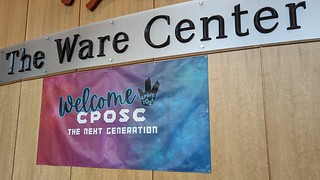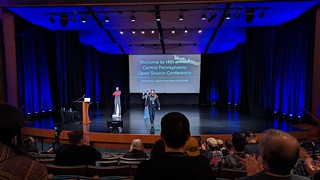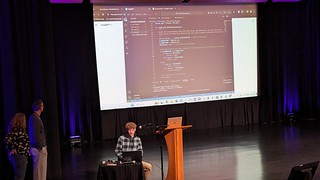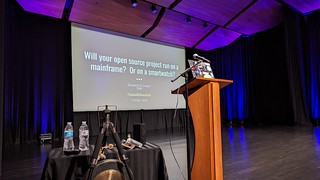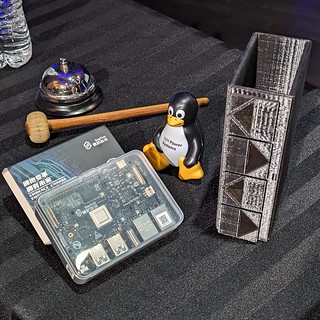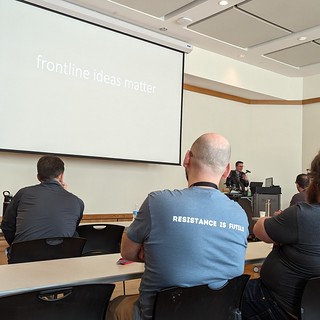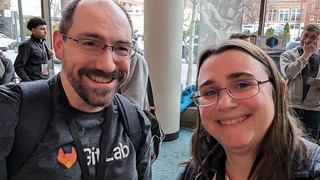Regional open source conferences are so important. I’m reminded of this yet again as I come home from another Central Pennsylvania Open Source Conference (CPOSC), which for the second year in a row aligned with our spring visit to Philadelphia. They may not have the numbers power to impress the marketing team or whoever is looking at statistics for event sponsorship, but as a speaker or an individual attendee, they are some of the most important events I participate in.
First, they tend to mostly attract locals, so you meet folks you won’t see at other conferences and allow you to get an idea for what’s popular and how they’re using technology in their region. Secondly, they tend to be inexpensive, most are under $100. This is in vast contrast to some of the larger events put on by major tech players, where a ticket can easily run into the thousands. Plus, even if you can’t afford that, all the events I’ve gone to also have generously granted free passes to folks from various demographics, ensuring that the attendees are a diverse crowd. They also often happen on weekends (CPOSC is on a Saturday), which means folks who can’t get off from work to attend events can participate.
I also feel like these conferences get me closer to what most folks are doing with open source software at their organizations now. They aren’t all showing off the newest things, but they are showing off things that are incredibly popular and broadly used, and that gives a more genuine snapshot of where the industry is, rather than where it may be going. But I think the most important thing for me though is discovering pockets of innovation that I wouldn’t have otherwise encountered. From the individuals developing new ideas to the small companies that sponsor these events having innovative business models, these events are always remarkable for learning fascinating new things that may be overlooked elsewhere.
AI has been a big topic at a lot of events, and it was interesting to see how it unfolded at CPOSC. One talk centered around the idea of creating a digital self using the AI technology of today, including voice synthesis services and LLM prompts that are fed a lot of personal data. It was an interesting talk, but definitely keeps us in uncanny valley. The next talk that included an AI focus was a panel made up of a family unit, a pair of married professors whose work is both in computing, and a son who works in the tech industry but doesn’t code. The son demonstrated using ChatGPT to create code from a library for a device he was testing, and with English he was able to explain what he wanted the code to do, and have it spit out the code to do it. The resulting discussion was around how we teach software development. How much of the fundamentals of coding do we teach now? Should we also be teaching LLM prompt engineering? It was an interesting discussion that compared this transition to the one to higher level languages beyond Assembly (a parallel I’ve made myself as well) and doubling down on the fact that we will need some folks whose job is software engineering, even if some of the coding can now be done by AI.
I think for me the more interesting question for me was how many doors this opens for folks who don’t know how to code, but for whom having code written for them would transform their ability to succeed. I’ve known so many people over the years who needed to learn how to code, but don’t enjoy it and wish they could have stayed on their original path in arts, sciences, or where ever. How many ideas in the sciences have we lost because the experts in their respective fields are too busy doing basic coding work to make their breakthroughs? Or worse, just gave up? Or wasted their time doing things manually, forsaking computers entirely? There is a need for fast, high quality code, but I think for most people the ability to further streamline their interactions with computers on their own terms with code developed by LLMs is an exciting prospect. I’ve spent a lot of time feeling a bit apprehensive about use of AI in technology, but I’ve definitely turned a corner to be my more hopeful self again.
My own talk at the event happened just before lunch, where I was talking about building your open source project for various architectures. It was similar to the talk I gave a few weeks before at SCALE, but with a few localized tweaks and improvements from the last time I gave it, slides are here: Will_your_open_source_project_run_on_a_mainframe_Or_on_a_smartwatch_-_CPOSC_2024.pdf.
I’ve had some good feedback, and more to respond to post-event via email. Overall, I’m thrilled to see how much interest there is in software testing these days, and that people are thinking beyond the defaults in order to bring in more advanced testing techniques and tooling.
Naturally, I also brought along my props. This time it was an IBM Power Systems tux penguin, the VisionFive 2 SBC, and the 3d-printed IBM z16 I keep at our townhouse in Philadelphia, except for special outings like this one.
The final talk I went to before the closing lightning talks was on “How to get your ideas implemented at your organization” and it gave me a lot to think about. Career development-wise I’ve been advised to get more methodical about stakeholder buy-in, especially as I pursue ideas that are not universally popular. The speaker outlined the strategies he’s come up with for being successful here, partially based on the time he spent as a Chief Innovation Officer. A huge part of this is just sitting down with people to listen to how your idea impacts them, incorporate feedback, and develop a sense of shared ownership for the idea. It gave me a lot to think about and helped solidify my own natural tendency to just reach out to people and ask. I think for me what would help the most is some training on how to be more tactful and polished when I approach people, since I can be very technical and direct by nature.
Of course, I also know people at CPOSC. I was able to meet up with several folks I know, including my long-time events-all-over pal Jason Plum of GitLab. CPOSC or the Philly Linux Users Group are where I get to catch up with most people I see there, so I always look forward to this opportunity to catch up.
I went to the after party for a bit to grab pizza and a beer while continuing chats with folks, including a few people I randomly ended up with as we walked over to the venue. I think we all have a natural tendency not to end up alone at events, so we latch on to a few people, which I absolutely do, but I also have grown comfortable with walking around alone and coming up with things to talk about with strangers. It’s a little anxiety-inducing, but it pays off in spades over time. Many long-time relationships have been forged after chance meetups in hallways.
My friend Will walked me halfway to the train station at the conclusion of my stay in Lancaster, which was a lovely time to catch up. The train ride home was uneventful, though it was a long day and I was tired, so I curled up with some podcasts for most of the journey home. We’ll see where this event lands next year and whether I’m close enough to attend, but it certainly was a delight to stop by two years in a row!


